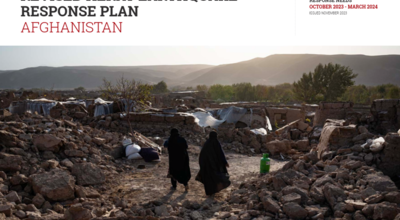Afghan project eases business licensing, reduces ‘opportunities for corruption’
KABUL - An Afghan Government project launched two years ago seeking to address the country’s “highly bureaucratic, time consuming and expensive business licensing regime” has reduced administrative burdens and opportunities for corruption, said a minister in the capital, Kabul, today.
“We are happy to have a streamlined and more efficient licensing system in place now,” said Afghanistan’s Minister for Commerce and Industries, Anwarulhaq Ahadi.
He was speaking at an event organized to mark the second anniversary of the launch of the Afghanistan Business Licensing Reform project, for which funding was provided by an independent Afghan-managed organization working to improve the country’s business environment, ‘Harakat.’ The organization provided funds to the International Finance Corporation (IFC), a member of the World Bank Group, to implement the project within the Ministry of Commerce and Industries (MoCI).
With the new system and rules in place, it takes only two days – down from 30 days – to obtain a business license, and required procedures have been reduced to only eight steps from 21 steps before, according to a news release issued by MoCI, which said the old system lacked transparency, and required both start-ups and existing businesses to comply with unnecessary requirements.
Corruption is a problem with parts of Afghanistan’s bureaucracy. The 2012 Corruption Perception Index of Transparency International ranked the South Asian nation as one of the most corrupt in the world.
A report released by the UN Office on Drugs and Crime (UNODC) in February this year said despite some progress, Afghans paid almost $4 billion in bribes in 2012, a 40 per cent rise since 2009 equaling double the country’s domestic revenue. The findings, prepared jointly with the Afghan High Office for Oversight and Anti-corruption, reported that half of Afghan citizens paid a bribe while requesting a public service.
“There is an urgent need for sustainable economic growth in Afghanistan, and this can only be accomplished by reforms to the country’s business environment,” said the Chief Executive Officer of Harakat, Naseem Akbar. “As a facilitator of business climate reform, Harakat takes immense pride in the positive impacts this project has on Afghanistan’s business environment. This is a big step towards our goal.”
An operations officer of IFC, Meagan Andrews, said small businesses and entrepreneurs are the “lifeblood of any economy.”
“But they are often the most susceptible to slow moving bureaucratic processes. This licensing reform project has already helped entrepreneurs to focus on growing their business and creating new jobs,” Ms. Andrews added.
The next phase of the project will ensure the sustainability of the reforms, improve cooperation between departments and raise awareness of best practice, according to the MoCI news release.
 UN
UN








